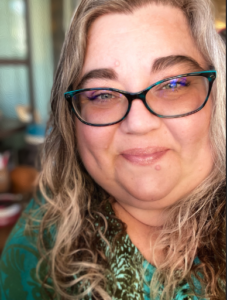Journeys to Humanism: Finding Solace and Perspective in Vonnegut’s Humanism

Journeys to Humanism, theHumanist.com’s regular series, features real stories from humanists in our community. From heartwarming narratives of growth, to more difficult journeys, our readers open up about their experiences coming to humanism.
Louise Jett
Carlinville, IL, USA
From an early age, I sought deeper meaning. This led me to become a devout Christian in a family of atheists. The idea of death terrified me and I found solace in Christianity. So I joined a fundamentalist, small-town church as a child. I immersed myself in church activities and felt a profound love for Jesus and the community.
However, my journey took a turn when I was forced to leave in the middle of a church service for giggling when a toddler started playing peek-a-boo with me. I was mortified. The experience led me to realize all the indoctrination and brainwashing I had been through. My doubts surfaced, and by age fourteen, I had become an atheist. I felt betrayed and lost, but literature, particularly the books of Kurt Vonnegut, offered me solace and perspective. Vonnegut’s humanism, emphasizing ethical living without divine intervention, resonated deeply with me.
When I started to research Vonnegut to learn more about him as a person, I discovered his connection to humanism. The American Humanist Association celebrated him with the Humanist of the Year award in 1992, and he served as AHA’s honorary president from 1992-2007. Vonnegut came from a longline of “freethinkers.” He once said in an interview, “My ancestors, who came to the United States a little before the Civil War, were atheists. So, I’m not rebelling against organized religion.”
When asked if he thought organized religion can make anybody happier, Vonnegut said, “Oh, of course, lots of comforting lies are told in church–not enough, but some.” He summed up his humanism in a famous quote you may have heard, he once wrote, “Humanists try to behave decently and honorably without any expectation of rewards or punishments in an afterlife. The creator of the universe has been unknown to us so far. We serve as well as we can to the highest abstraction of which we have some understanding, which is our community.”
Long story short, I arrived at humanism’s doorstep via the way of Kurt Vonnegut and the AHA. I want to shout out a big thanks to both for introducing me to such a vital life stance! Humanism representation is important. What if Vonnegut didn’t identify as a humanist? What if the AHA didn’t recognize him as Humanist of the Year? Would I have discovered or explored humanism on my own? I honestly don’t know. Eventually, my exploration of humanism led me to Ethical Culture, where I found a supportive community that aligns with my values of social justice and ethical action.
Inspired by figures like Vonnegut, I believe in the transformative power of humanism and strive to lead by example, advocating for human rights and equity. Humanism is my religion. I appreciate that to be a humanist I do not have to embrace comforting lies. I am not forced to behave according to dogma. I can be accepting of all faiths (and none) and appreciative of all ways of living that do not infringe on the rights of others. There is no one right way to live, and I know that we are stronger together. I am grateful for Vonnegut, and all the other humanists (known and unknown, dead and living) who trust the best in human thinking while actively living their values. Humanists are inspiring. These are my people.
We all have our own stories of how we came to be humanists, and we want to hear yours! Fill out the form here to be featured in this series. You can also share your journey and chat with others on the Journeys to Humanism channel on the AHA’s Discord Server.
